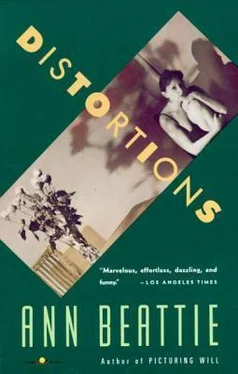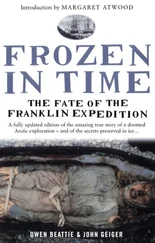Ann Beattie - Distortions
Здесь есть возможность читать онлайн «Ann Beattie - Distortions» весь текст электронной книги совершенно бесплатно (целиком полную версию без сокращений). В некоторых случаях можно слушать аудио, скачать через торрент в формате fb2 и присутствует краткое содержание. Год выпуска: 1991, Издательство: Vintage, Жанр: Современная проза, на английском языке. Описание произведения, (предисловие) а так же отзывы посетителей доступны на портале библиотеки ЛибКат.
- Название:Distortions
- Автор:
- Издательство:Vintage
- Жанр:
- Год:1991
- ISBN:нет данных
- Рейтинг книги:5 / 5. Голосов: 1
-
Избранное:Добавить в избранное
- Отзывы:
-
Ваша оценка:
- 100
- 1
- 2
- 3
- 4
- 5
Distortions: краткое содержание, описание и аннотация
Предлагаем к чтению аннотацию, описание, краткое содержание или предисловие (зависит от того, что написал сам автор книги «Distortions»). Если вы не нашли необходимую информацию о книге — напишите в комментариях, мы постараемся отыскать её.
Distortions — читать онлайн бесплатно полную книгу (весь текст) целиком
Ниже представлен текст книги, разбитый по страницам. Система сохранения места последней прочитанной страницы, позволяет с удобством читать онлайн бесплатно книгу «Distortions», без необходимости каждый раз заново искать на чём Вы остановились. Поставьте закладку, и сможете в любой момент перейти на страницу, на которой закончили чтение.
Интервал:
Закладка:
She puts it down quietly on the bureau. He’s fallen asleep. She sits in a chair and watches the snow fall, and in a while she closes her eyes and begins imagining things: mountains, and blue, blue water, all the snow melted into water. This time the name of the country comes to her: Greece. She’s been sent to Greece to find something on the beach, but she just stands there staring at the mountains in the distance, the water washing over her feet. Her feet are cold; she takes them out of the water, backing up onto the sandy beach. She’s lifted her feet from the floor, waking up. She goes to the bureau and gets the tea, even though it’s cold. The snow is falling heavily now. Everything is blanketed in whiteness; it clings to the trees, her car is covered with snow. She must have slept through the night. She hears his sister downstairs, closing the door behind her.
“I take her for granted,” the old man says. “Like snow. Every day I expect more snow.”
The plant is gone. She looks in all the rooms and can’t find it. Her watch is on the bathroom sink, where she put it when she showered. She showers again and washes her hair, blows it dry. The bathroom is steamy; she can’t see her face in the glass.
“David?”
She thought she heard something, but it was only a branch brushing against the bathroom window. She walks naked up to the bedroom and puts on jeans and one of David’s sweaters. She notices that some of the books he’s been studying have been replaced in the bookcase. Now she’s sure she hears him. The dog runs into the house. The front door bangs shut.
“Hi,” she calls.
“Hi.” David is climbing the steps. “I’m not used to you working for a whole week. I never see you.” His cheeks are so cold they sting when he kisses her. “I was down at the Duanes’. They had puppies born this morning.”
“What kind?”
“Collies.”
“Take me to see them,” she says.
“They were going out when I left.”
“We could go later in the afternoon.”
“They’ll think I live there,” he laughs.
“It’s good for you to be out. You’ve been working so hard.”
“I haven’t done any work for a couple of days.”
“Yes you have. I saw pages of notes on the dining-room table.”
“Larry left his notes behind. He brought them down to read me an article he’s working on. He teaches at the university. Botany.”
“Botany?” she says. “Is that what happened to the plant?”
“They liked it so much I gave it to them. It was such a freak thing, to grow that way in the winter.”
She calls early in the morning: 4 A.M. The telephone rings, and there is no answer. The old man can tell that she’s worried when he awakens.
“I tried to get my husband last night but there was no answer.”
“Men are heavy sleepers.”
“No,” she says. “He’d wake up.”
“All men are heavy sleepers. I can sleep when people are talking — I don’t even hear the children talking on their way to school any more. I can sleep with the light on.”
“I think school was canceled,” she says, looking out the window.
It has snowed all night. It’s still snowing.
“Call my sister and tell her not to come,” he says. “If anything happens I can call.”
She picks up the phone in the upstairs hallway and gives his sister the message, but the old lady is coming anyway. She has boots and an umbrella, and she’s coming. He shakes his head.
“It’s terrible to be old. You have no power.”
He gets out of bed and opens a bureau drawer.
“Can I help you?”
“I’m putting on my things to go for a walk in the snow.”
“You should stay inside. It’s too cold today.”
“I don’t feel the cold any more. I can go out.”
“Have breakfast first,” she says.
“No. I want to go out before she comes.”
She leaves the room while he dresses. He takes a long time. Maybe his sister will come early, before they go out. No. He opens the door and walks out without his cane, wearing a sweater and a silk scarf tucked into the neck.
“My jacket is in the hall closet,” he says. “I need the air.”
She helps him down the stairs. He doesn’t weigh much. She asks if he’ll take his cane, but he wants her arm instead. She gets his jacket and holds it for him to put on. She takes her own jacket out of the closet and zips it.
It’s bright outside. They both stop, momentarily blinded by the glare. The snow is wet and deep.
“Just down the walk,” she says.
“Yes. All right.”
Children, off from school, are playing in the yards. Someone has already built a snowman. He likes it, wants a closer look. They go down the walk to the sidewalk. The children next door call hello. A little boy comes over to tell the old man about the snowman he’s built. On another lawn some children are building a fort. Two little girls in snowsuits are carrying snow to the fort in buckets. She sees a big boy push a small boy into a snowbank. It’s just fun. It’s not just fun — he’s kicking snow on him, kicking the little boy.
“Wait!” she says.
The big boy kicks snow in her face and runs. She pulls the younger boy out of the snow, brushing it out of his hair.
“What happened?” she asks him. He’s crying, brushing himself and pointing to the boy who ran away at the same time. Now another boy is screaming. She turns and sees that the old man has slipped in the snow. She runs back. He’s red in the face, but he’s all right. He bent over to make a snowball and one of the children accidentally ran into him. She reaches down to help him up. He’s light, but it’s hard to get a good grip. The pavement is slippery, she’s afraid she might slip. She sends one of the children home to get his mother. But a man walking down the sidewalk has already bent to help the old man up.
“What are you doing here?”
“I came to pick you up,” David says. “Your car never would have made it up the hill. I had chains put on.”
They help the old man into the house. In the hallway he brushes snow off his shoulders, embarrassed and angry. He thinks the child knocked him over on purpose. She hangs up his coat and David helps him upstairs. He goes up the stairs more quickly than he came down, talking about the boy who knocked into him. But he’s forgotten about it by the time his sister arrives. He’s telling David about Berlin in the winter, about the birds. He complains about his memory — Berlin must have been beautiful in the spring. When his sister arrives she’s brought fruit for her, too, saying that she’s a nurse, she must know about Dr. Pauling. It’s her last day. The daughter and the husband will be coming home from Florida. But the sister comes every day, even when they’re home — she has an umbrella and high boots. Wait. The old man has something for her: a postcard. He’s giving her the postcard. The stars twinkle brightly in her hand.
The children are still playing when she goes outside with David. The big boy she spoke to earlier hides behind a car and tries to hit them with a snowball, but he misses. David’s mad at her, mad that she took the old man out. He won’t speak.
“We’ll have to go back for my car,” she says.
No answer.
“I called you last night and there was no answer.”
He looks up. “You called?”
“Yes. You weren’t there.”
“I didn’t know it was you. I was asleep. Why were you calling?”
The snow is very deep. He’s driving slowly, concentrating so the car doesn’t skid. On the radio, the weather forecast calls for more snow.
“I guess you were walking the dog in the woods,” she says.
“I just told you,” he says. “I was asleep.”
She closes her eyes, imagines him sleeping, then imagines him with the dog, pulling a broken branch out of the snow, holding it high for the dog to jump up. The dog yelps, runs in circles, but the snow is too deep to jump out of. David is asleep, under the covers. He’s walking up the hill, the dog barking, jumping for the stick. She tries to imagine more, but she’s afraid that if she doesn’t open her eyes she’ll fall asleep in the car.
Читать дальшеИнтервал:
Закладка:
Похожие книги на «Distortions»
Представляем Вашему вниманию похожие книги на «Distortions» списком для выбора. Мы отобрали схожую по названию и смыслу литературу в надежде предоставить читателям больше вариантов отыскать новые, интересные, ещё непрочитанные произведения.
Обсуждение, отзывы о книге «Distortions» и просто собственные мнения читателей. Оставьте ваши комментарии, напишите, что Вы думаете о произведении, его смысле или главных героях. Укажите что конкретно понравилось, а что нет, и почему Вы так считаете.












